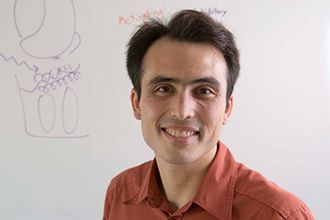
Research
Effective immune responses against infectious agents and cancer require that immune cells traffic to the correct locations and then identify and specifically respond to threats by physically interacting with other cells. Leukocytes are particularly well suited for these tasks because they can completely reorganize their structure in a matter of minutes in response to surface receptor stimulation. This remarkable plasticity enables them to function both rapidly and effectively in a wide variety of physiological contexts. Our lab studies the signaling mechanisms that control leukocyte architecture and also how specific cellular structures contribute to immune function. A better understanding of these issues could aid in the development of strategies to better modulate immune responses in vivo. We are particularly interested in the following properties.
Killer lymphocytes destruction of infected or transformed target cells: Cytotoxic T lymphocytes (CTLs) and natural killer (NK) cells play a central role in immune responses against intracellular pathogens and tumors. CTLs and NK cells kill by forming a stereotyped interface with their targets, known as a cytolytic immunological synapse, into which they secrete a mixture of toxic perforin and granzymes. Our research efforts in this area focus on 1) how the cytolytic synapse is assembled and 2) how specific aspects of synaptic architecture promote target cell killing. Our approach relies heavily on high-resolution imaging of lymphocyte-to-target-cell interactions.
Cell-to-cell interactions contribution to intercellular communication: A large portion of intercellular communication in the immune system is mediated by transient, structurally dynamic contacts between cells, of which the immunological synapse is a prime example. Although it is generally believed that these interactions control the scope and intensity of information transfer, our knowledge of how they do so is quite limited. We aim to understand how the unique physical environment imposed by the synapse affects the communicative chemical interactions that occur within it.
Multidisciplinary strategies for visualizing intracellular signaling and intercellular communication: Immune cell-to-cell interactions are difficult to study because they undergo continuous structural remodeling and because the participating cells are often quite small. To circumvent these issues, we have developed photochemical reagents that enable us to activate micron-scale polarized signaling responses using a focused pulse of ultraviolet light. We have also applied bioengineering and materials science to create synthetic microenvironments for the observation of localized secretory and biophysical responses. These approaches provide us with an added level of spatiotemporal precision when analyzing the dynamic aspects of immune cell structure and function.
Current Projects:
- Interfacial mechanical force in the control of immune cell-cell interactions.
- Biophysical sensitization or resistance to immune pressure.
Bio
Dr. Huse spent much of his childhood in East Asia before completing high school in Los Angeles. After graduating from Harvard University with a degree in Biochemical Sciences, he carried out doctoral work at the Rockefeller University, where he studied with John Kuriyan, Tom Muir, and Joan Massagué. His thesis research focused on the phosphoregulation of the type I TGFβ receptor. After receiving his Ph.D., Dr. Huse worked as a postdoctoral fellow in Mark Davis’ lab at Stanford University, where he studied signal transduction and polarized effector responses in T cells. He joined the MSKCC Immunology Program in 2007.
Distinctions.
- 2014-2018 Leukemia and Lymphoma Society Scholar
- 2008-2012 Cancer Research Institute Investigator
- 2008-2011 Searle Scholars Award
- 2002-2005 Helen Hay Whitney Postdoctoral Fellow
